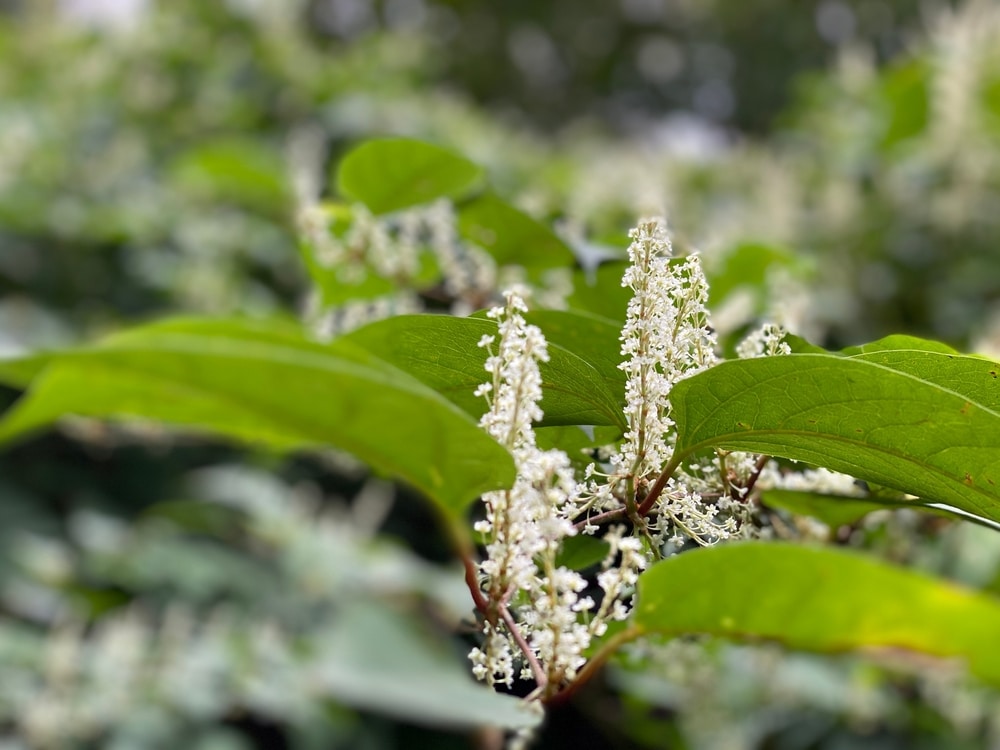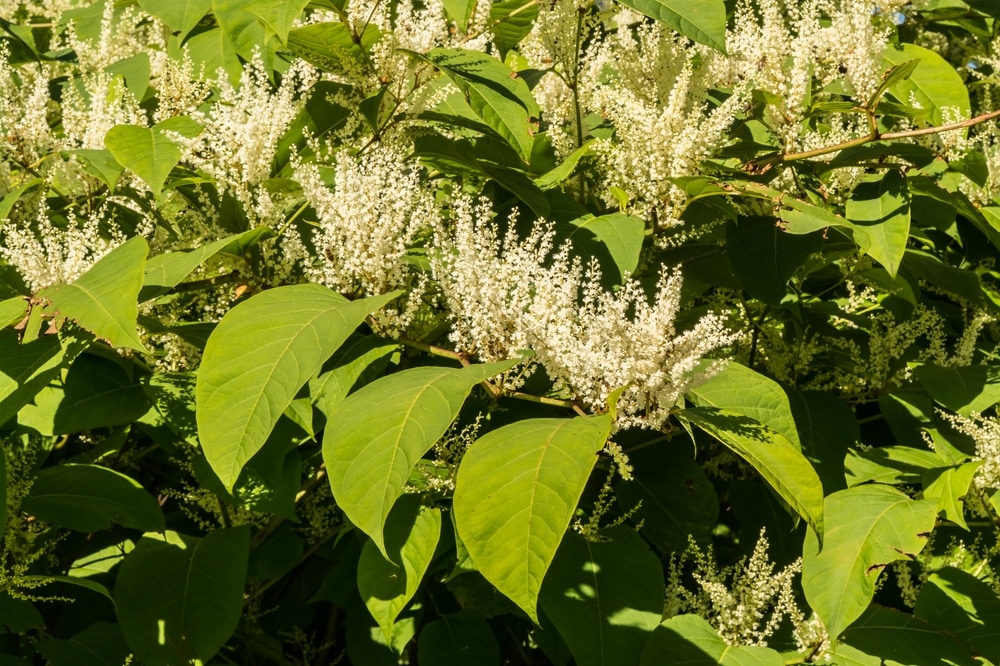There are many invasive plant species in the UK.
Japanese Knotweed is one of the most well-known.
Let’s look at how to eliminate this invasive weed in the article below.

What is Japanese Knotweed?
Japanese Knotweed (sometimes called Asian Knotweed) is an invasive plant common to the UK, Europe, and elsewhere.
In appearance, the weed has a zig-zag stem structure, ‘shovel’ shaped leaves, and often blooms white flowers during the summer months.
Japanese Knotweed has been known to cause structural damage to properties, as it can grow through cracks in walls, drains and pathways.
It can also overpower other ecosystems in your garden.
While you are not legally required to remove it if you find it on your premises, it is highly recommended that you keep it under control.
If you are found to have spread Japanese Knotweed into the wild, you could then be prosecuted.
Where has Japanese Knotweed come from?
As the name suggests, Japanese Knotweed is native to Japan, Korea, and China.
The German physician and explorer Philipp Franz von Siebold (1796 – 1866) first brought it to Europe in 1850.
All Japanese Knotweed (Reynoutria japonica) in Europe and North America today descends from a single female plant he brought to Holland.
His motivation for transporting the plant to Europe was scientific. As a keen botanist, he had collected over 1,000 plant specimens in Japan.
Do I need to disclose if I have Japanese Knotweed?

Since 2013, if Japanese Knotweed is present a property the owner wants to sell, they are legally required to disclose this information.
You will also need to provide details of the plan to remove it.
Buyers can struggle to get a mortgage on a property with Japanese Knotweed.
Why is Japanese Knotweed a problem?
Japanese Knotweed is particularly hard to eradicate because its roots grow extremely deep (over 6ft/2 metres) and can survive for up to 20 years.
Potential buyers cannot typically get a mortgage if your house has Japanese Knotweed growing inside.
If you do not eradicate it, you may have to sell your house to a cash buyer or significantly reduce your asking price.
Japanese Knotweed can impact the ecosystem in your garden, causing the disappearance of some other important plants.
If a professional survey is carried out and Knotweed is either missed or misidentified by the expert, then this is classed as ‘Professional Negligence’.
On the other hand, if you deliberately hide it from a buyer, you could be sued for a significant amount.
How common is Japanese Knotweed?
It has been estimated that around 2% of development sites and 1.25% of residential properties in Great Britain are affected by Japanese Knotweed.
This amounts to tens of thousands of sites in total…
In the UK, Japanese Knotweed can most commonly be found near water – especially streams and rivers.
How to get rid of Japanese Knotweed…
It is strongly recommended that you hire an expert to handle Japanese Knotweed rather than dealing with it yourself.
Unless you have the required expertise and experience, you might make the situation worse.
There are experts who you can hire to get rid of Japanese Knotweed. They will spray it with chemicals (usually a particular type of weedkiller, amongst other things), as this is the most proven way of eradicating it.
To remove Japanese Knotweed with weedkiller, take the following steps, starting in the summer or early autumn:
- Cut down the stems and canes as much as possible
- Spray the cut canes with the glyphosate weedkiller
- Wait at least seven days for the weedkiller to take effect and then pull out all that’s left of the weed, including the root
- Mow over the area weekly, to prevent it from regrowing
- Apply weed killer to the area twice a year, to ensure it doesn’t grow back
It usually takes most people three to four seasons to remove Japanese Knotweed completely. Professionals can achieve this in one to two seasons.
In the process of removing Japanese Knotweed, there are certain things you need to get permission for.
For example, it is illegal to put this weed in your garden waste bin.
Certifications are required for using specific chemicals. If you want to bury, burn, or dispose of Japanese Knotweed, demonstrate to local authorities that you will handle it appropriately.
How much does it cost to remove Japanese Knotweed?
The cost of paying an expert to remove Japanese Knotweed varies depending on the severity of the situation.
According to Checkatrade, hiring someone for this service starts at £1,500 and can go above £2,000 in many cases.
Remember that while this price can seem steep, its negative effect on your property will go significantly higher than this figure, making it a worthwhile investment.
Should I hire an expert to remove Japanese Knotweed?
Yes, it is highly recommended that you hire an expert to manage any Japanese Knotweed.
There are various types of Japanese Knotweed, and the circumstances affect which method will best remove it. Only an expert will be able to:
- Assess the situation
- Use the correct chemicals
- Comply with all legal regulatory bodies
- Dispose of it in the right way
- Explain ways to stop it coming back
When selling your house, an in-depth report on the problem and how it was corrected may be required.
Could I be confusing Japanese Knotweed with something else?
Japanese Knotweed is often confused with other similar-looking plants.
Russian vines also have white flowers, but their leaves are narrower, and their stems do not grow as high.
Himalayan honeysuckle also looks similar to Japanese Knotweed but has very different flowers when they bloom.
These other plants are less regulated and troublesome than Japanese Knotweed, so it’s essential to correctly identify what you are dealing with.
What other invasive plant species are there in the UK?
There are also many other invasive plants in the UK that do not look like Japanese Knotweed, including:
- Giant Hogweed
- Himalayan Balsam
- Three-Cornered Garlic
It is illegal to plant and allow them to grow in the UK.
Should I buy a house with Japanese Knotweed?
Just because a house has Japanese Knotweed present doesn’t mean it should be instantly disregarded.
However, the circumstances will make a big difference in whether you should buy it.
For example, if an expert has confirmed that it could be removed then the house may still be worthy of your consideration. Ideally, the expert will also have provided a detailed action plan and costs.
Any price and hassle involved should be removed from your bid, so you are offering below the typical market value.
If you have several other options, you may prefer a house without Japanese Knotweed (even if it is more expensive), as you can avoid the hassle of getting it removed and dealing with the consequences.
















